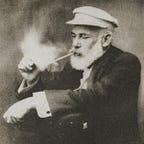“Paradoxical and, in a sense, Tragic”
The craft is here, but the movie isn’t. Ari Aster considered this to be more of a “picaresque” than a horror picture. This is only half-true. While it is the case that the horror isn’t as potent as in his previous works, everything about this film guffaws like a blend of Kafka and Sade, spoofing his previous works (and likely laying the technical foundations for what he’s going to make), rather than a flawed-hero adventure. Indeed, there isn’t an adventure, as the protagonist Beau doesn’t even bother with taking any initiative to go anywhere: everything just happens to him, drives him out into wherever the script takes him. It works best as abuse porn, when the audience craves for the orgasmic agonies of the protagonist. But, judging from the three times I chose to endure this in theaters, most viewers certainly don’t have any interest in challenging themselves with this wheel of confusion, still less the obstacle of disgrace.
Joaquin Phoenix’s Beau is essentially Freud’s orally-fixated man: dependent, gullible, passive, and immature, likely from nutritional deficiency in infancy. However, his psychosexual fixation, like the heightened nature of his reality, can’t be easily nor exactly defined in terms of our medical psychology (it isn’t like Freudian psychology is exactly scientific anyway). It’s expulsive, which is like anal-fixation but not oral-fixation, which can only manifest itself in either passivity or aggressivity (or perhaps, passive-aggressivity, recall the scene where he strangles mother). Instead of being addicted to eating, drinking, and smoking (like symptoms of a normal oral fixation), Beau was constantly doing the opposite. This would explain some of the anxieties and morbidities he exhibited through the dark humor and the surreal horror: when he vomited up his junk in the stomach onto a computer screen displaying a childhood crush he couldn’t handle, or when he perceives malignancy from Toni’s offer for him to smoke (a violative abuse of his sacrosanct mouth, much like one of sexual genitalia), or when Toni forces him to drink a can of blue paint (an option of suicide that makes the most sense from Beau’s perspective).
Adding to the layer of Beau’s psychoanalytical dysfunction is the coded dynamic between him and his mother Mona: the Oedipus complex. Beau’s fear of his own sex is later revealed to be the result of his mother’s manipulation, likely for her own purposes. But the superficial gestures of fear, hatred, and lust towards his own mother is as far as the extent to which the movie was willing to take us inside the sick mind of Beau. It puts up a good freak show, but there’s nothing under the layer.
Beau’s physical resemblance aligns with the subtext of his name: a derision of ‘beauty’ by shortening it to a four-letter word, which makes sense given his gross and pathetic appearances and behaviors. His self-detestation is even heightened by his world, one filled with dangers, confusions, and obscenities. Besides the characters, the world of Beau, in Aster’s own words, is supposed to be an “evil clown mirror of the real world”. The Columbia flag hints at an America from alternate reality as the setting. There indeed seems to be some social critiques here, but no one can be sure with its meta-surreal monstrosities.
★★★☆☆
Originally published at https://letterboxd.com/redmoonrising/film/beau-is-afraid/
